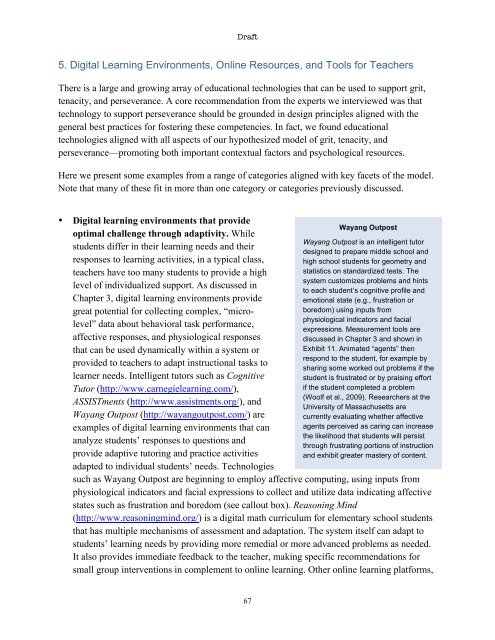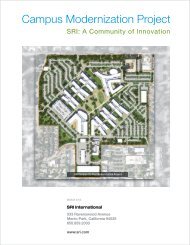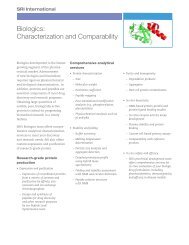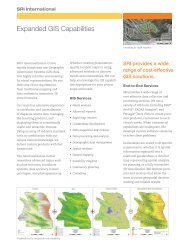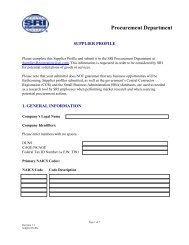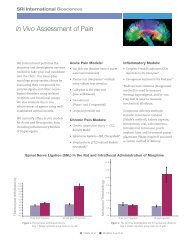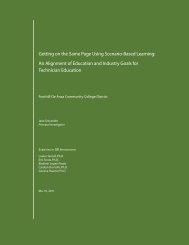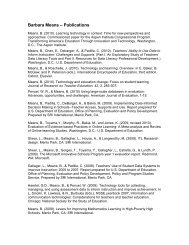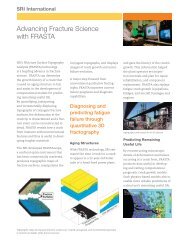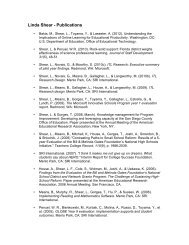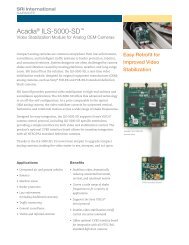Promoting Grit, Tenacity, and Perseverance - U.S. Department of ...
Promoting Grit, Tenacity, and Perseverance - U.S. Department of ...
Promoting Grit, Tenacity, and Perseverance - U.S. Department of ...
You also want an ePaper? Increase the reach of your titles
YUMPU automatically turns print PDFs into web optimized ePapers that Google loves.
Draft<br />
5. Digital Learning Environments, Online Resources, <strong>and</strong> Tools for Teachers<br />
There is a large <strong>and</strong> growing array <strong>of</strong> educational technologies that can be used to support grit,<br />
tenacity, <strong>and</strong> perseverance. A core recommendation from the experts we interviewed was that<br />
technology to support perseverance should be grounded in design principles aligned with the<br />
general best practices for fostering these competencies. In fact, we found educational<br />
technologies aligned with all aspects <strong>of</strong> our hypothesized model <strong>of</strong> grit, tenacity, <strong>and</strong><br />
perseverance—promoting both important contextual factors <strong>and</strong> psychological resources.<br />
Here we present some examples from a range <strong>of</strong> categories aligned with key facets <strong>of</strong> the model.<br />
Note that many <strong>of</strong> these fit in more than one category or categories previously discussed.<br />
• Digital learning environments that provide<br />
optimal challenge through adaptivity. While<br />
students differ in their learning needs <strong>and</strong> their<br />
responses to learning activities, in a typical class,<br />
teachers have too many students to provide a high<br />
level <strong>of</strong> individualized support. As discussed in<br />
Chapter 3, digital learning environments provide<br />
great potential for collecting complex, “microlevel”<br />
data about behavioral task performance,<br />
affective responses, <strong>and</strong> physiological responses<br />
that can be used dynamically within a system or<br />
provided to teachers to adapt instructional tasks to<br />
learner needs. Intelligent tutors such as Cognitive<br />
Tutor (http://www.carnegielearning.com/),<br />
ASSISTments (http://www.assistments.org/), <strong>and</strong><br />
Wayang Outpost (http://wayangoutpost.com/) are<br />
examples <strong>of</strong> digital learning environments that can<br />
analyze students’ responses to questions <strong>and</strong><br />
provide adaptive tutoring <strong>and</strong> practice activities<br />
adapted to individual students’ needs. Technologies<br />
Wayang Outpost<br />
Wayang Outpost is an intelligent tutor<br />
designed to prepare middle school <strong>and</strong><br />
high school students for geometry <strong>and</strong><br />
statistics on st<strong>and</strong>ardized tests. The<br />
system customizes problems <strong>and</strong> hints<br />
to each student’s cognitive pr<strong>of</strong>ile <strong>and</strong><br />
emotional state (e.g., frustration or<br />
boredom) using inputs from<br />
physiological indicators <strong>and</strong> facial<br />
expressions. Measurement tools are<br />
discussed in Chapter 3 <strong>and</strong> shown in<br />
Exhibit 11. Animated “agents” then<br />
respond to the student, for example by<br />
sharing some worked out problems if the<br />
student is frustrated or by praising effort<br />
if the student completed a problem<br />
(Woolf et al., 2009). Researchers at the<br />
University <strong>of</strong> Massachusetts are<br />
currently evaluating whether affective<br />
agents perceived as caring can increase<br />
the likelihood that students will persist<br />
through frustrating portions <strong>of</strong> instruction<br />
<strong>and</strong> exhibit greater mastery <strong>of</strong> content.<br />
such as Wayang Outpost are beginning to employ affective computing, using inputs from<br />
physiological indicators <strong>and</strong> facial expressions to collect <strong>and</strong> utilize data indicating affective<br />
states such as frustration <strong>and</strong> boredom (see callout box). Reasoning Mind<br />
(http://www.reasoningmind.org/) is a digital math curriculum for elementary school students<br />
that has multiple mechanisms <strong>of</strong> assessment <strong>and</strong> adaptation. The system itself can adapt to<br />
students’ learning needs by providing more remedial or more advanced problems as needed.<br />
It also provides immediate feedback to the teacher, making specific recommendations for<br />
small group interventions in complement to online learning. Other online learning platforms,<br />
67


